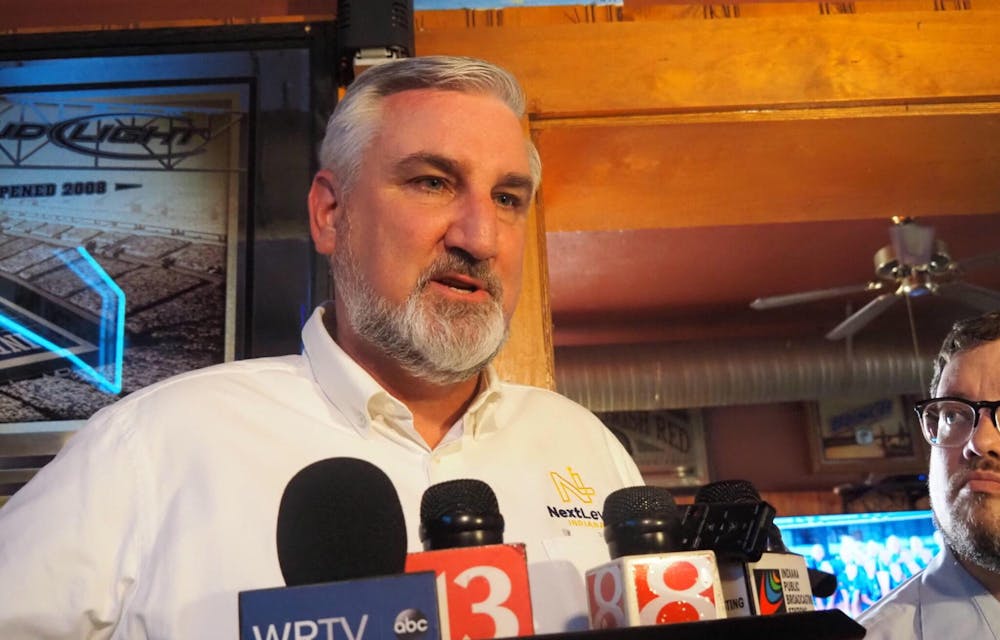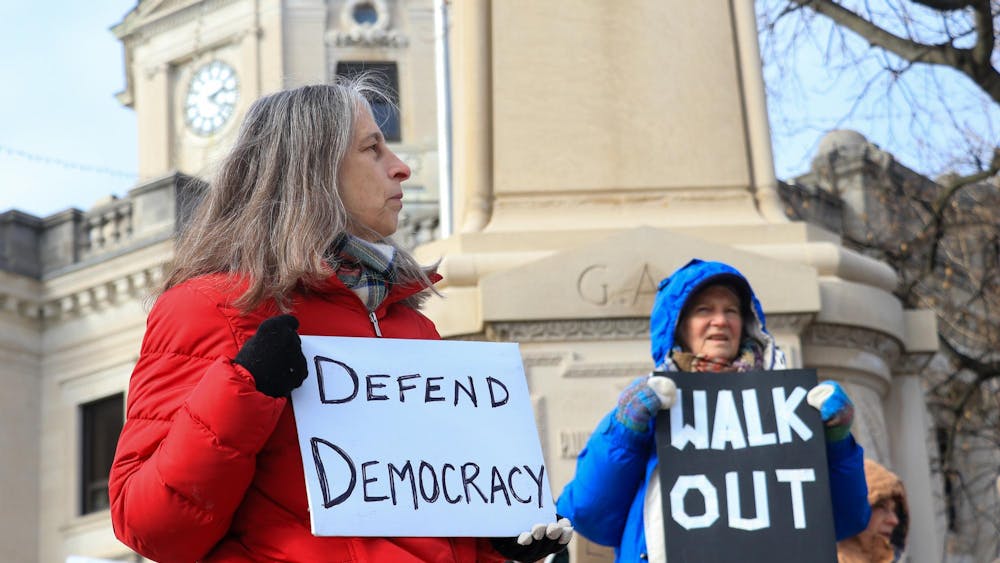On March 13, as many of us on IU’s campus were distracted celebrating spring break miles away in Florida and still in the midst of recovering from Daylight Saving Time at that, Indiana Gov. Eric Holcomb signed 75 bills into law.
Among these, he signed one legalizing Happy Hour, and that seems to have captured much of the public’s attention. His public relations stunt of marking the papers in a crowded Indianapolis dive bar worked: it’s a catchy headline, one much catchier than “Holcomb signs bills loosening teenage labor laws” or “Holcomb increases oversight of state universities to foster conservative thought.”
And now that I’m writing those facts down, I’ve suddenly realized the logic behind burying these signatures beneath half-priced day drinking. As I watch the wings of authoritarianism slowly spread over my state (not that I’m very surprised; the archaic bird of prey has been perched here in plain sight for several long, cruel decades), I feel compelled to have a few drinks too.
Indiana University is a public university, and what this means is simply that the state of Indiana has major sway in dictating its functional behaviors and makeup. For example, our Board of Trustees — the university’s governing body — has nine members, and two-thirds of them are chosen by the state’s governor. A governor who has, since 2005, been Republican.
With the passage of Senate Bill 202, these boards — not just at IU but every public Indiana college — would be required to consider “intellectual diversity” in granting professors tenure and in considering the extension of tenure. What “intellectual diversity” really refers to is a bit vague and, really, the whole concept seems a bit obvious: aren’t universities already, at least theoretically, crucibles of intellectual diversity? I’ve argued they’re really not, but I’d be very surprised if Holcomb and the Republicans of the General Assembly were looking to prevent the censuring of pro-Palestinian voices.
The bill is almost certainly in reference to the fact many conservatives believe they’re not able to speak freely about their views on college campuses. A poll published by the Associated Press found that only 20% of Americans argued that campus conservatives have “a lot” of freedom to speak their mind; on the other hand, 47% argue the same about liberals. Ignoring the problematic dichotomy present in this poll — it’s the age-old American idea of there only being two polarized viewpoints — it’s clear what the data is suggesting.
Conservatives have long argued that they’re an oppressed minority figure in the field of American academia. They’d have you believe that our college campuses are fields of Marxist thought, that the professors praise Mao Tse-Tung and assign “Guerrilla Warfare” and “Are Prisons Obsolete?” in math class. Even the most hardened libertarians, Republicans would have you believe, leave college having been forced to experiment with several pronouns and, ultimately, feel pushed into a non-binary identity. And then Joe Biden is elected president for four more years, Kamala Harris after him. The ghost of Karl Marx wins, and we all live in communes. It’s really a damn shame.
But, in all seriousness, this fantasy of oppression is far from the truth. The March 2018 results of a study published by Sanford J. Ungar, director of the Free Speech Project at Georgetown University, found that, across the board, speech suppression on college campuses has never exclusively targeted conservative voices. And, when they have, it’s been a handful of the same high-profile, highly problematic figures: think Ben Shapiro, Richard Spencer or Milo Yiannopoulos.
However, to much less fanfare, there have been many incidents of lower-profile figures on the left being suppressed for their political speech, and this has only been further demonstrated with the systemic attack on pro-Palestinian student groups and professors at colleges across the country. Senate Bill 202, then, ever-championed by the Republicans, doesn’t seem to be addressing anything close to reality — it’s simply an attempt to materialize their fantasy into reality.
Oppressors are never fond of considering themselves oppressors. They want to believe they’re marginalized; they want to believe they’re a disenfranchised countercultural voice whose reactionary views are justified because of it. The American conservative has a vested interest in positioning themselves in this way, positioning themselves as a disempowered actor. The simple reason for why their positions are uncommon on campus is that they are anti-intellectual and regressive. And it’s for this reason that we cannot allow them to dictate our educational spaces.
It’s an election year — that is, a national election year, in only eight months' time we’ll gather to vote for our next president — and all eyes are on the Oval Office and all thoughts are on the existential dilemma of whether to vote for a 77-year-old man or an 81-year-old man and the geopolitical implications of either option. Amid all the chaos these questions and images may have wrought, it’s easy to forget that we’re voting, too, for the leader of our state — the president of our own little republic.
The Indiana Republican Party has an evaluation awaiting them the same time as Biden and the Congressional Democrats. Voting in the gubernatorial elections this year may not do much to affect the Israeli-Palestinian conflict, and it may not do much to ensure the passage of a universal healthcare act or an increase to the federal minimum wage or the codification of abortion rights into federal law, but it can, and will, have several practical ramifications for our student body and the state at-large.
Joey Sills (he/him) is a junior majoring in English, with a minor in political science.






